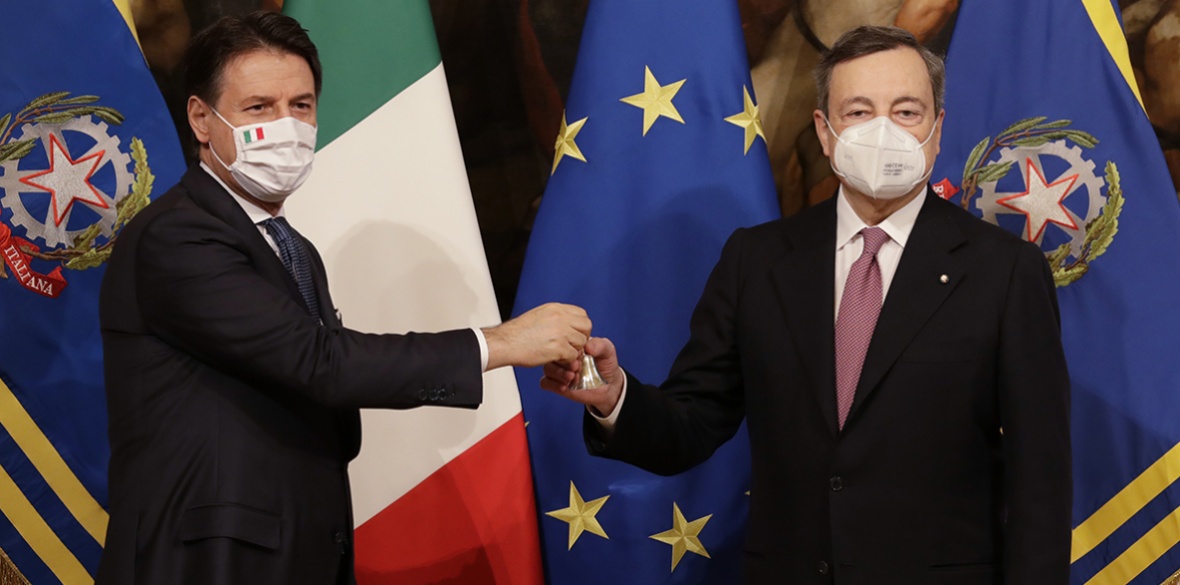This is the last article you can read this month
You can read more article this month
You can read more articles this month
Sorry your limit is up for this month
Reset on:
Please help support the Morning Star by subscribing here
Italy is about to suffer its third period of EU-sanctioned economic shock medicine.
At precisely the point at which the EU’s top-down bureaucratic model of decision-making has been tested to destruction by the Covid-19 crisis Italy, one of the weakest of the subordinate nation states, is plunged into yet another economic regime change at the hands of an EU apparatchik.
This time round the instrument for this exercise in the realpolitik of 21st-century European capitalism is Matteo Renzi. His vehicle is the minuscule Italia Viva parliamentary fraction which has manufactured a crisis of confidence in the Italian government.
Even by the degraded standards of Italian parliamentary politics Renzi is ranked low.
It is not that he is open to the best offer. On the contrary he is already the most committed of Italian politicians to the dictates of the German and French banks, big business interests and the bureaucratic machinery of the European Commission. Renzi, self-styled as Italy's Tony Blair, is his country's least popular politician while his electoral vehicle, Italia Viva, scores below 3 per cent.
But the former Democratic Party leader and prime minister has just enough parliamentary clout to engineer the crisis that led to the appointment of Mario Draghi as prime minister. This former boss of the European Central Bank and head of the Italian Treasury has been embraced by the Establishment parties of both the centre right and the nominal centre left including the now repentant former EU critics of the right-wing populist Lega.
Draghi is not the first technical expert to be drafted in to manage Italy’s permanent crisis of economics and politics but he is a pioneer of the policy in which the solution to supposedly insoluble problems is contracted out.
The illusion of popular or national sovereignty definitively disappeared with the EU’s Maastricht treaty which Draghi himself negotiated.
It is the Maastricht treaty which ratcheted up the drive to privatisation and in Britain under Chancellor Gordon Brown in Tony Blair’s cabinet gave us the disaster of PFI and the foundations of every later “austerity” policy.
Italy lost leverage over its own economy with the adoption of the euro and now even the fig leaf of parliamentary sovereignty is negotiated away with the appointment as prime minister of a man widely seen as the embodiment of EU-sanctioned austerity.
In Britain a certain historical amnesia affects politicians, especially labour movement figures, about Maastricht and the privatisation and PFI deals it brought.
At Labour Party and TUC conferences it was hailed as a creative mechanism to ensure investment in schools and hospitals when the obligations of EU membership entailed limits on public expenditure.
No-one with a career at stake is prepared to publicly defend PFI today but equally very few are principled enough to draw the conclusion that austerity was the inevitable effect of shackling our decision-making to the the EU.
EU Commission president Ursula von der Leyen will take much of the blame for the continent-wide cock-up over Covid vaccine procurement.
While her manifest incompetence draws comparison with her time as Germany’s defence minister and her attempts to deflect blame are widely seen as self-serving, the structural flaws in the EU's architecture are most at fault.
Draghi is far-sighted enough to see the failure to tackle the Covid crisis as a deep challenge to the EU’s credibility, not least to an Italian public where anti-system thinking and specifically anti-EU sentiment is rising on the left, endemic in the Five Star Movement’s electoral base, and hardly diminished on the far right even by Salvini's backsliding.
His problem is that there is no lasting solution to Italy’s capitalist crisis within the EU.










